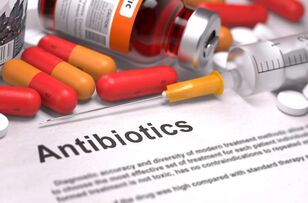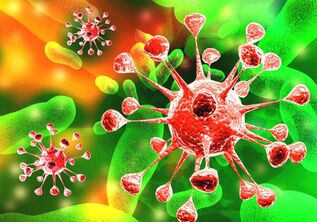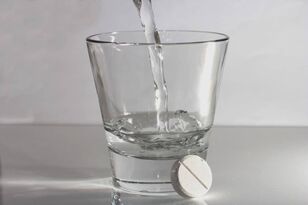Antibiotic therapy is the cornerstone of treatment for prostatitis. Antibiotics for prostatitis are divided into several groups. The choice of a drug depends on the nature of the inflammatory process and the characteristics of the pathological process in the patient. Usually, pathogenic microorganisms develop resistance to the active substance of the drug. In such cases, antibiotic therapy is selected taking into account the susceptibility of pathogens to certain active substances and the drug is prescribed only after bacterial analysis in prostate fluid. .
Why do antibiotics need to be used?

With an exacerbation of prostatitis, the first priority is to stop the inflammatory process. For this, antibacterial therapy is indicated, since only antibacterial drugs can quickly eliminate the pathogen that provokes the inflammatory process.
Symptomatic treatment without the use of antibacterial drugs is ineffective and has only temporary results. Any anti-inflammatory, analgesic and antipyretic drugs for prostatitis are used only in addition to antibiotic treatment.
Remove allowed pathogens:
- analgesic syndrome;
- normalizes body temperature;
- improves urodynamics;
- normalizes prostate function.
Thus, antibiotics can not only eliminate the inflammatory process of the prostate gland in men, but also reduce the symptoms. The improvement in health is due to the elimination of swelling of the inflamed organ. The inflamed organ always increases in size and puts pressure on the surrounding tissues, causing pain.
Antibiotics treat both the symptom and the cause of the disease.
The main advantages of antibiotics are that they are fast and easy to use. Treatment of prostatitis with antibiotics is carried out with pills, injections or the use of suppositories.
For drugs to really work quickly, you need to make the right choices according to your doctor's instructions. To determine the type of pathogenic microorganism, it is necessary to undergo a series of tests, first of all - a bacteriological study of the composition of the excretion of the prostate gland. Only the identification of the causative agent of the inflammatory process ensures that the optimal selection of drugs will quickly reduce exacerbations.
It is important to note that antibiotics for prostatitis are indicated only for the treatment of infectious forms of the disease, both acute and chronic. With noninfectious inflammation, development due to age-related changes or a violation of the nutritional properties of the prostate gland, the use of antimicrobial agents is not appropriate, as is adenoma. .
Medicines
In the treatment of prostatitis, preference is given to the use of broad spectrum drugs that are active against a large number of pathogens. This choice is explained by the fact that in some cases prostatitis is caused by the simultaneous action of multiple pathogens.
The following drugs are effective antibiotics for prostatitis:

- fluoroquinolones;
- cephalosporin;
- macrolite;
- tetracyclin;
- penicillin.
Each drug is effective only against certain groups of bacteria.
Every antibiotic listed for prostatitis is active against a number of microorganisms. Drugs from different groups are interchangeable, in the case of inflammation caused by an opportunistic microorganism, for example E. coli.
Fluoroquinolones
Antimicrobial drugs of the fluoroquinolone group are collectively referred to as antibacterial drugs. In terms of pharmacological action, these substances exhibit a pronounced antimicrobial activity, however, in terms of composition, they are not antibiotics.
The main difference between fluoroquinolones and broad spectrum antibiotics is their synthetic composition. Fluoroquinolon, in contrast to antibiotics from the penicillin or tetracyclin group, has no natural analogues. This is the main advantage of the drugs in this group - since there is no natural substitute for the active substance, it means that the pathogens cannot develop drug resistance, and the treatment of chronic prostatitis with resistancefluoroquinolone production will be more effective.
Drugs in this group are active against most bacteria, including sexually transmitted infections (chlamydia, Trichomonas). Today, fluoroquinolone is the best drug for the treatment of bacterial prostatitis. Depending on the exact dosage and the correct choice of the drug, fluoroquinolones show a rapid therapeutic effect and cause fewer side effects compared to antibiotics. All drugs of this group are toxic, so it is necessary to follow the treatment regimen recommended by the doctor.
In chronic bacterial inflammation, drugs of this group are used for a long, 3-4 week course.
The list of drugs in the fluoroquinolone group is quite extensive, so in order to choose the optimal drug, you need to consult a specialist. As directed by the doctor, it is possible to adjust the regimen and duration of treatment.
Penicillin
In most cases, doctors prescribe penicillin for the first episode of prostatitis. Such antibiotics for prostatitis are well tolerated by the body and have a pronounced therapeutic effect, blocking the activity of some opportunistic bacteria that cause prostatitis.
Most people are resistant to this group of drugs. This is due to the fact that penicillins have been used to treat any bacterial inflammation for the past 50 years. To increase therapeutic efficacy, the use of an antibiotic combination in the treatment of prostatitis in men is practiced - these are drugs with penicillin and clavulanic acid.
The combination use of drugs allows you to quickly achieve a therapeutic effect. These drugs are well tolerated, have few side effects and are affordable, making them popular. Among the forms of release are suppositories for prostatitis with antibiotics, tablets and capsules, a solution for intramuscular injection. Despite the fact that antibiotics can quickly end an infection, men prefer the pill because it's easy to use.
Doctors and patients give good reviews of these products, note:
- a pronounced antibacterial effect;
- convenient release format;
- cost acceptable;
- minimal side effects.
Thanks to clavulone in its composition, the preparations penetrate well directly into the tissues of the prostate gland.
Medicines of this heading are to be used for three weeks. The maximum dosage is 1 g of active ingredient per day, which is equivalent to 1-2 tablets, depending on the form of release.
Usually these drugs cause gastrointestinal disturbances, manifested by diarrhea, nausea, and stomach pain. In order to minimize negative effects on the mucous membranes, you should consult your doctor about the indications for the use of probiotics.
Tetracyclines
The use of an antibiotic tetracycline to treat prostatitis in men has decreased in recent years. This is due to a large number of side effects and insufficient absorption of the active substance in the inflamed prostate tissues.
The advantage of the drugs in this group is pronounced activity against chlamydia and ureaplasma. The downside is the negative effect on the digestive tract, a large number of cases of individual intolerance and a negative response of the body.
Due to the risk of complications, you should not use this group of drugs on your own. The treatment regimen and duration of therapy are selected by the doctor on an individual basis.
Macrolide
When wondering what antibiotics can be used to treat prostatitis, many people tend to favor macrolides. Drugs of this group are quite common, they are especially often prescribed in cases where other drugs are ineffective, which occurs when pathogenic microorganisms become resistant.
Unlike other antibiotics, macrolides have some minor uses. These drugs are prescribed only for inflammation caused by chlamydia, ureaplasma and gonococcal infections.
Despite the fact that the mechanism of action of these drugs on an inflamed prostate is not exactly understood, the main advantages of these drugs are their low toxicity and minimal side effects. Along with its relatively affordable cost, this makes it a popular drug for men to treat prostatitis.
The course of treatment depends on the severity of the inflammatory process and takes an average of about three weeks. Preparations of the macrolide group are produced in the form of tablets, as well as solutions for injection, so the latter preparations are not widely used in patients due to the inconvenience of use.
Cephalosporin
Antibiotics of the cephalosporin group are one of the most effective drugs for bacterial prostatitis. Medicines provide rapid relief of symptoms within a few days after starting treatment. Due to its affordable cost, drug treatment will be inexpensive and affordable for everyone. The drugs are accepted by the body and practically have no side effects, however, they have one significant drawback - they are only produced in the form of an injection solution. At home, not everyone can give themselves an injection, so cephalosporin treatment is mostly done in the hospital.
The regimen of prostatitis with these drugs is selected by a doctor. Usually, 1 injection of the drug is prescribed per day for 7-14 days.
The doctor decides which medicine to choose after examining the patient. Drugs in this group are broadly active, but not effective against chlamydia.
List of drugs in tablets

It is most convenient to treat prostatitis at home with pills or capsules. Popular drug groups in this form of release:
- penicillin;
- macrolite;
- fluoroquinolones;
- tetracyclin.
The treatment of inflammation, as well as the length of the course and the regimen - it depends on the dose of the drug and the form of the disease. Antibiotic therapy takes 10-12 days for acute inflammation and three weeks for chronic inflammation.
Antibiotics are recommended to be taken immediately after a meal. It is recommended to take the capsule at the same time every day. If the drug is used several times a day, the interval between doses should be the same.
Antibiotic suppositories
Another convenient form of home treatment is a rectal antibiotic suppository.
The duration of the course of treatment is 7-21 days, depending on the severity of symptoms. Usually, to achieve the best therapeutic effect, doctors prescribe simultaneous use of suppositories and tablet antibiotics, and choose drugs with different active ingredients. This combination therapy allows you to stop the inflammatory process as soon as possible.
Candles are used once a day. They are introduced into the rectum at bedtime.
Precautions
Any antibacterial drug has a number of contraindications. You should get acquainted with this list before you start taking the drug. Absolutely contraindicated to use any kind of antibiotic:
- individual intolerance;
- acute renal failure;
- acute liver failure;
- drink at the same time as alcohol.
Most adverse reactions during antibiotic treatment are observed in the gastrointestinal tract. These include intestinal dysbiosis, diarrhea, stomach upset, nausea and vomiting.
If there are undesirable reactions of the body, it is allowed to replace the drug with drugs with other active ingredients in the preparation. The prescription of fluoroquinolones to replace the penicillin antibiotic with the development of later side effects or drug intolerance is quite frequent. However, analogues should be selected by the doctor, depending on the characteristics of the reaction to the drug.































